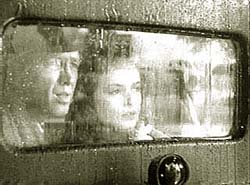
As always, spoilers lie within.
If thrillers are not my favorite genre of movies, Disturbia does a great job of refreshing the conventions and updating the Rear Window motifs.
Efficient exposition, but something's fishy
Screenwriters Christopher B. Landon and Carl Ellsworth show us what motivates the protagonist quickly, neatly, and violently. Kale Brecht (Shia LeBoeuf) and his father are buddies. We get it. When they crash on the way home from a day of fly fishing and the father Daniel dies, and Kale later decks a teacher in school, we get that. It’s a lot of mayhem, but it works. For efficiency and an adrenaline spike, it’s perfect.
But it’s such a big event – traumatic for characters and graphic for viewers – that it weighs in as more than an expository beat. Granted, it shows how the privileged, suburban kid will come to be clapped into house arrest. But if you’re still thinking at the end, you're wondering about Kale and his father. Hold that thought until we get to the third act.
Trapping Kale at home is a great dramatic situation that limits the characters, settings, and action, and all of these put pressure on the protagonist. Also, it observes Aristotle’s unity of place and Hitchock’s unity of paranoia. That is, given enough time and insufficient entertainment, a human being will make up stories about what he sees and develop a free-floating terror of it. Kale becomes convinced that his neighbor Robert Turner (the unfailingly creepy David Morse) is a serial killer. The story Kale and Ronnie and Ashley tell themselves soon convinces them all that Kale’s right.
While there’s little question who the sociopath is, finding out what he’s done, where he did it, and what the teens will do to answer those questions left me with half-moon fingernail cuts in my forearms. The best of the second act reversals comes when Kale’s friend Ronnie (Aaron Yoo) has been caught, killed, and narrow-cast on video into Kale’s bedroom. Or perhaps his dead body is in Kale's closet. Or not.
Bottom of the seventh and, Ohhh, where did that knuckleball come from?
But dramatically, two stories develop in parallel rather than entangling in one another to focus the storytelling and the audience’s emotional reaction. Kale pulls out all the geeky digital stops of 'kids these days' to capture evidence of violence, murder - anything. When his limits bar him from getting into Turner’s house, he sends Ronnie. At the same time, he’s befriended and be-flirting with Ashley Carlson (Sarah Roemer). She joins their cabal, spys on Turner, and increasingly commits herself to the conclusion that he’s a killer. Ronnie serves as a sounding board for Kale, allowing us to know what he’s thinking. But he's rarely more than an extension of Kale, for purposes of dialog and in the phystical world behind the limits of Kale’s electronic surveillance anklet.
Maybe it seemed too close to the Rear Window plot to put Ashley in the role of Kale’s confidante, reluctant co-conspirator, daring partner, threatened amateur investigator, and love interest. Though she gets involved, Ashley is well out of harm’s way in the concluding sequences. Rather than focusing on the girl Kale cares about most, at the denouement the focus shifts to his mother Julie Brecht (Carrie-Ann Moss), who Turner kidnaps and imprisons in a desparate moment.
Sure, it makes sense that Julie would try to convince Turner not to press breaking-and-entering charges against her son. And what son wouldn’t rescue his mother, no matter the past antagonism between them? (Are you reading this, Mom?) But why, with so much risky turf to explore, such a pretty girl do it, and such strict limitations on Kale - why didn’t we get the goose-pimple inducing pleasure of watching Ashley fall into murderous peril? Then we would have had the satisfaction of seeing Kale rescue her, confirm his suspicions about Turner, and serve up primal justice?
Everybody's got a hungry heart. Except this guy.
That nagging first act question about Kale’s father didn’t quite bite the story in the ass, but the more I thought, the more I heard it barking. Inwardly, Kale suffers an emotional blow that leaves his bruised or scarred, maybe for life. What part of his story is informed by his father’s death and that wound? Is he seeking forgiveness, redemption, a father figure, a resolution of the rage he feels at the universe? Any of these would have been good if they were glimpsed through the thriller plot. Because the emotional goal of Kale’s story is absent, the violent dispatching of his father seems like a heartless trick of screenwriting, “Well, if he loves his father, kill him off. That’ll get him going.” I’m not complaining about the tricks. I just believe in finishing what you start.
I know, I know. You're going to say, "Dude, it's a movie. Chill!" That's it exactly. It's a movie.
[The disclaimer, a.k.a. 'Respek': All movies are hard to make, hard to write, hard to hold to the original vision when collaborating, even with the best intentions. The “movie” is the story we saw, not the story the screenwriter wrote. Every story can be better. I love a good story. I break things to see how they work. Go out and buy a ticket or purchase the DVD. Support a screenwriter. Decide for yourself.]




